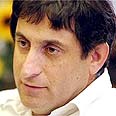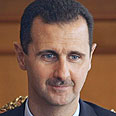
'Strategic U-turn.' Meridor
Photo: Alex Kolomoisky

'Litmus test.' Assad
Photo: Reuters
Ambassador Meridor: Talks aimed at breaking up Syria-Iran alliance
'First reason to engage with Syrians is to explore whether there is a chance for a strategic U-turn, and to have them separated from their special relationship with Iran,' Israeli envoy tells The Washington Times, adding UN sanctions on Tehran 'not enough'
WASHINGTON - "There can't be true peace if Syria continues to align with the Iranian regime and with terror groups," such as Lebanon's Hizbullah, Israeli Ambassador to Washington Sallai Meridor told The Washington Times this week.
Meridor said the main reason the Israeli government began talks with Syria earlier this year was to "bring about a strategic repositioning" in the Middle East by breaking up Damascus' alliance with Iran, adding that a "U-turn" in Syria's policy is a "litmus test" for reaching a broad peace agreement with Damascus.
Northern Front
Roee Nahmias
Syrian president tells Sarkozy next round of indirect negotiations, which was scheduled to begin Sunday, postponed due to 'domestic situation in Israel' and resignation of Israeli representative Yoram Turbowicz. Sarkozy: Iran taking great risk by pursuing nukes
"By far, the first reason to engage with the Syrians is to explore whether there is a chance for a strategic U-turn, and to have them separated from their special relationship with Iran and stopping their harboring, encouraging and supporting of terror," he was quoted by the Washington Times as saying.
According to Meridor, the indirect talks, which are being facilitated by Turkey, have yet to yield any positive results, but "it's so important that for us it was worth trying to explore".
'Window of opportunity narrowing'
The ambassador compared the current talks with former Egyptian President Anwar Sadat's efforts to reach a peace agreement with Israel in the 1970s, which ended with the historic Camp David accords.
"If they choose to move a la Sadat, then we'll know that we have contributed to a significant change for the better, not only for us, but for the world," Meridor told The Washington Times. "If they choose not to, we know where we stand and we know that we tried."
The envoy said Israel is prepared to make "very painful compromises" in exchange for Syria's breaking away from Iran's influence, but declined to be more specific.
Asked by The Washington Times whether the United States has advised or otherwise contributed to Israel's reachout effort, the ambassador said that nothing of what Israel has done so far was a surprise to Washington.
Meridor continued to say that the prospect of Iran building a nuclear weapon is the most serious security threat in the Middle East today. "The window of opportunity" to deter that threat "is narrowing but not yet closed," he said.
According to the ambassador, the three rounds of UN sanctions on Tehran so far are "not enough". He called on European companies to consider cutting the supply of refined gasoline products to Iran as a way to put more pressure on the regime.















